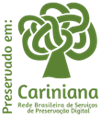Análisis de la presencia y articulación de la concepción teórica de la catalogación de materias en la literatura científica de la Internacional Society for Knowledge Organization – ISKO: un análisis de dominio
DOI:
https://doi.org/10.62758/re.v1i4.82Palabras clave:
Catalogación de Temas, ISKO, Análisis de Dominio, Análisis Bibliométrico, Indicadores de Citas, Red de CitasResumen
Considerando el importante papel que juega la Catalogación por Materias en el universo teórico-metodológico del tratamiento temático de la información, buscamos analizar la construcción de su marco teórico en ISKO. Para ello, partimos de un estudio histórico-conceptual para llegar al análisis de las 36 comunicaciones (27 de ISKO y 9 de ISKO - España) referentes a este tema. Sobre este corpus se realizó un análisis bibliométrico en cuanto a las fuentes documentales utilizadas (forma, lenguaje y vida media) y los autores citados (redes de citas a través del software PAJEK). Los resultados del análisis revelaron una presencia aún tímida de este tema en el universo analizado, destacando el predominio de fuentes documentales basadas en artículos de revistas, publicados en inglés, con una vida media joven (14 años para ISKO y 11 para ISKO-España).
Citas
BARITE, M. Organización del conocimiento: um nuevo marco teórico: conceptual en Bibliotecologia y Documentacion. In: CARRARA, K. (Org.) Educação, universidade e pesquisa. Marília: Unesp; São Paulo: FAPESP, 2001. p.35-60 DOI: https://doi.org/10.36311/2001.85-86738-16-6.p35-60
BUFREM, L. S. Levantando significações para significantes: da gestão do conhecimento a organização do saber. Disponível em: <http://www.encontros-bibli.ufsc.br/bibesp/esp_01/1_bufrem.pdf>. Acesso em: 20 maio 2008. DOI: https://doi.org/10.5007/1518-2924.2004v9nesp1p1
DANUELLO, J. C. Produção científica docente em tratamento temático da informação no Brasil: uma abordagem métrica como subsídio para a análise de domínio. Marília: Unesp, 2007. Dissertação (Mestrado) – Programa de Pós-Graduação em Ciência da Informação - Universidade Estadual Paulista (Unesp).
FERREIRA, G. M.; MARTINHO, N. O. Análise da presença e articulação da concepção teórica do subject cataloguing na literatura científica da international society for knowledge organization – ISKO. Marília: FFC/Unesp, 2008. Relatório de Pesquisa PIBIC/CNPq.
________. Análise da presença e articulação da concepção teórica do subject cataloguing na literatura científica da international society for knowledge organization – ISKO. Marília: FFC/Unesp, 2009. Relatório de Pesquisa PIBIC/CNPq.
FORESTI, N. A. B. Contribuição das revistas brasileiras de Biblioteconomia e Ciência da Informação enquanto fonte de referência para a pesquisa. Ciência da Informação, Brasília, v.19, n.1, p.53-71, jan./jun. 1991.
GUEDES, V. L.; BORSCHIVER, S. Bibliometria: uma ferramenta estatística para a gestão da informação e do conhecimento, em sistemas de informação, de comunicação e de avaliação científica e tecnologia. [s.n.t.].
GUIMARÃES, J. A. C.; FERNÁNDEZ-MOLINA, J. C. Los aspectos éticos de la organización y representación del conocimiento en la revista Knowledge Organization. In: FRIAS, J. A.; TRAVIESO, C. (Orgs.). Tendências de investigación en organización del conocimiento / Trends in knowledge organization research. Salamanca, 2003. p.809-816
________. A análise documentária no âmbito do tratamento da informação: elementos históricos e conceituais. In: RODRIGUES, G. M.; LOPES, I. L. (Orgs.) Organização e representação do conhecimento na perspectiva da Ciência da Informação. Brasília: Thesaurus, 2003. (Estudos Avançados em Ciência da Informação, 2)
________ et al. Aspectos éticos en organización y representación del conocimiento (ORC): um analisis de la bibliografía científica em busca de uma categorización preliminar de valores. In: GASCON, J.; BURGUILHOS, F.; PONBS. A. (Orgs.). La dimensión humana de la organización del conocimiento / The human dimension of knowledge organization / La dimensió humana de l’organizació del coneixement. Barcelona, 2005.
________. A dimensão teórica do tratamento temático da informação no universo científico da International Society for Knowledge Organization – ISKO. Marília, 2007. Projeto integrado de pesquisa apresentado ao CNPq.
________. A dimensão teórica do tratamento temático da informação e suas interlocuções com o universo científico da Internacional Society for Knowledge Organization (ISKO). Revista Ibero-Americana de Ciência da Informação, Brasília, v.1, n.1, jan./abr. 2008.
HJØRLAND, B.; ALBRECHTSEN, H. Toward a new horizon in information science: domain-analysis. Journal of the American Society for Information Science, v.46, n.6, p.400-425, 1995. DOI: https://doi.org/10.1002/(SICI)1097-4571(199507)46:6<400::AID-ASI2>3.0.CO;2-Y
HJØRLAND, B. Domain analysis in information science: eleven approaches-traditional as well as innovative. Journal of Documentation, v.58, n.4, p.422-462, 2002a. DOI: https://doi.org/10.1108/00220410210431136
________. Epistemology and the socio-cognitive perspective in Information Science. Journal of the American Society for Information Science and Technology, v.53, n.4, p.257-270, 2002b. DOI: https://doi.org/10.1002/asi.10042
MEADOWS, A. J. A comunicação científica. Brasília: Briquet de Lemos, 1999.
VANZ, S. A. de S.; CAREGNATO, S. E. Estudos de citação: uma ferramenta para entender a comunicação científica. Em Questão, Porto Alegre, v.9, n.2, p.295-307, jul./dez. 2003.
Descargas
Publicado
Cómo citar
Número
Sección
Licencia
Derechos de autor 2021 Revista EDICIC

Esta obra está bajo una licencia internacional Creative Commons Atribución 4.0.
La Asociación posee los derechos de autor de los textos que publica y adopta la licencia Creative Commons, CC BY 4.0 DEED Atribución 4.0 Internacional (https://creativecommons.org/
Usted es libre de:
- Compartir: copiar y redistribuir el material en cualquier medio o formato para cualquier propósito, incluso comercialmente.
- Adaptar: remezclar, transformar y construir a partir del material para cualquier propósito, incluso comercialmente.






